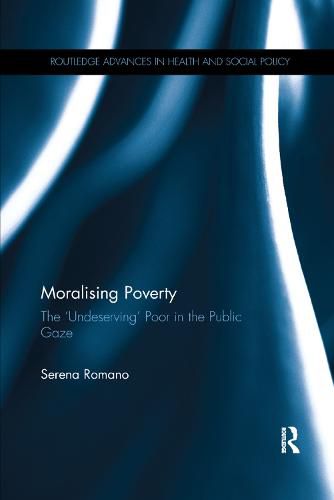Readings Newsletter
Become a Readings Member to make your shopping experience even easier.
Sign in or sign up for free!
You’re not far away from qualifying for FREE standard shipping within Australia
You’ve qualified for FREE standard shipping within Australia
The cart is loading…






Do we judge the poor? Do we fear them? Do we have a moral obligation to help those in need? The moral and social grounds of solidarity and deservedness in relation to aid for poor people are rarely steady. This is particularly true under contemporary austerity reforms, where current debates question exactly who is most ‘deserving’ of protection in times of crisis. These arguments have accompanied a rise in the production of negative and punitive sentiments towards the poor.
This book breaks new ground in the discussion of the moral dimension of poverty and its implications for the treatment of the poor in mature welfare states, drawing upon the diverse political, social and symbolic constructions of deservedness and otherness. It takes a new look at the issue of poverty from the perspective of public policy, media and public opinion. It also examines, in a topical manner, the various ways in which certain factions contribute to the production of stereotyped representations of poverty and to the construction of boundaries between ‘insiders’ and ‘outsiders’ in our society. Case studies from the UK and Italy are used to examine these issues, and to understand the impact that a moralising of poverty has on the everyday experiences of the poor.
This is valuable reading for students and researchers interested in contemporary social work, social policy and welfare systems.
$9.00 standard shipping within Australia
FREE standard shipping within Australia for orders over $100.00
Express & International shipping calculated at checkout
Do we judge the poor? Do we fear them? Do we have a moral obligation to help those in need? The moral and social grounds of solidarity and deservedness in relation to aid for poor people are rarely steady. This is particularly true under contemporary austerity reforms, where current debates question exactly who is most ‘deserving’ of protection in times of crisis. These arguments have accompanied a rise in the production of negative and punitive sentiments towards the poor.
This book breaks new ground in the discussion of the moral dimension of poverty and its implications for the treatment of the poor in mature welfare states, drawing upon the diverse political, social and symbolic constructions of deservedness and otherness. It takes a new look at the issue of poverty from the perspective of public policy, media and public opinion. It also examines, in a topical manner, the various ways in which certain factions contribute to the production of stereotyped representations of poverty and to the construction of boundaries between ‘insiders’ and ‘outsiders’ in our society. Case studies from the UK and Italy are used to examine these issues, and to understand the impact that a moralising of poverty has on the everyday experiences of the poor.
This is valuable reading for students and researchers interested in contemporary social work, social policy and welfare systems.